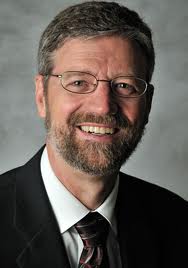By Ervin Stutzman
Some months ago, a pastor introduced me to his congregation as “the lead pastor of Mennonite Church USA.” I have since claimed that moniker because I am as comfortable with that description as the more formal title of “Executive Director.” Thus, in this column and several of those that follow, I shall claim the pastoral role.
In my November column, I defined power as “the ability to influence or control other people, as well as the physical world around us.” As it stands, that definition is incomplete. Allow me to add a couple of significant elements to this definition. For one, self-regulation or the ability to control one’s self is a very significant aspect of power. Another is the ability to transform a situation or relationship by one’s presence or action. Both of these aspects are very important to the role of the pastor.
Perhaps most people view power as a coercive or threatening force. As pastors, we should rarely, if ever, employ such force. We are not called to coerce others, but rather to exercise the power of personal example, persuasion and caring ministry. This is the meaning of Peter’s exhortation: “Be shepherds of God’s flock that is under your care, watching over them – not because you must, but because you are willing, as God wants you to be; not pursuing dishonest gain, but eager to serve; not lording it over those entrusted to you, but being examples to the flock” (1 Peter 5:20).
The spiritual power of ministry is exercised most directly through intimate knowledge of and contact with parishioners. Few professions offer such ready access to the treasures and terrors of the human heart. Therefore, by virtue of our position as pastors, we are poised to profoundly bless or deeply violate the people under our care. This is the power and peril inherent in our pastoral role, along with the accompanying ethical vulnerabilities. As part of this series, then, I intend to explore the dangers that lurk in the abuse of pastoral power. However, because of the deep ambivalence many of us feel regarding the exercise of power, I will begin by clarifying the positive aspects of the exercise of power in the pastoral role.
Perhaps the most important kind of power we can exercise in ministry is the power of testimony and personal example. Most people imitate what they see rather than what they are told to do. Especially when it comes to moral behavior and Christian virtues, few of us have the power to persuade others to do things which we ourselves are unwilling to do. When we try to do this, we may readily be told to “practice what you preach.”
Because spiritual growth and transformation are basic goals of the Christian life, the first and most important exercise of pastoral power is to expose oneself to the ongoing process of transformation by Christ. I take this to be the core meaning of the vision statement of Mennonite Church USA which says “God calls us to be followers of Jesus Christ and, by the power of the Holy Spirit to grow as communities of grace and joy and peace, so that God’s healing and hope flow through us to the world…”
Since we as pastors are called to lead these communities, we naturally become “Exhibit A” of God’s work in the world, particularly in our circle of influence. This rarely makes us heroes, although some might be tempted to put us on a pedestal. Rather, the glare of the spotlight reveals the cracks and crevices in our character more readily than that of other members of the congregation. Every time we preach a sermon, we reveal much of who we are, opening ourselves up to inspection and critique. As the saying goes, we “live in a fishbowl.” Consequently, the most powerful action we can take at times is to admit our foibles and shortcomings. Such action demonstrates in a vulnerable and authentic way that God’s grace is at work in our lives, empowering us for ministry and compensating for our weaknesses.
As leaders, we have the opportunity to witness God at work in the world and to interpret that to others. The unique power of the pastoral role is the opportunity, day after day and week after week, to demonstrate and explain the process by which God is at work in our own lives and in the lives of those around us. When that testimony rings true with the experience of our congregants, it has an inherent power that could never be achieved by force. As pastors, let’s exercise that power.


